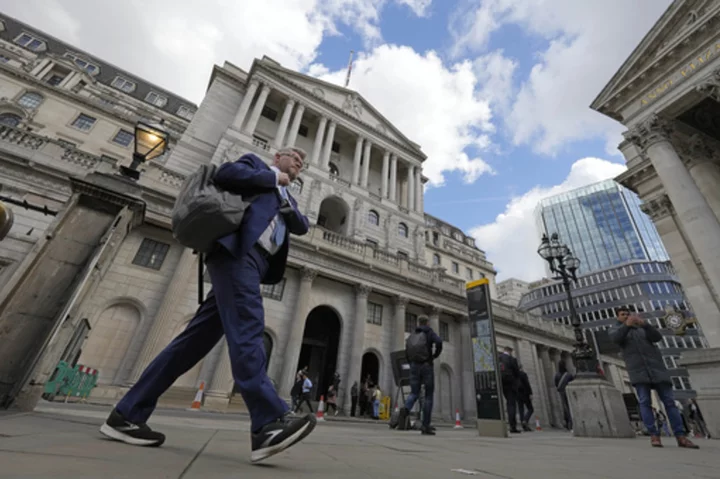LONDON (AP) — Homeowners across the U.K. are hoping that the Bank of England will decide to avoid raising interest rates Thursday for the first time in nearly two years, a decision that would come on the heels of similar action by the U.S. Federal Reserve.
Following Wednesday's news that U.K. inflation fell unexpectedly in August to 6.7%, its lowest level since Russia invaded Ukraine, expectations have grown that the Bank of England will opt to keep its main interest rate unchanged at a 15-year high of 5.25%.
Before the inflation figures were released, most economists thought the central bank would raise its key borrowing rate once again by a quarter of a percentage point to 5.5%. That's because inflation is still way above the bank's target rate of 2% and higher than in any other Group of Seven major economy.
Now, financial markets foresee the decision going either way.
Even if there is a rate hike, economists expect the bank to indicate that borrowing rates have peaked — to the relief of millions of homeowners who are facing higher mortgage rates.
Central banks worldwide appear to be near the end of an aggressive rate-hiking cycle meant to curb an outburst of inflation triggered by the bounceback from the COVID-19 pandemic and Russia's war in Ukraine. The U.S. Federal Reserve left rates unchanged Wednesday.
Suren Thiru, economics director for chartered accountant group ICAEW, said raising interest rates in the U.K. would be a “misstep” following the surprise fall in inflation.
“Although interest rates will probably rise on Thursday, additional tightening unnecessarily risks aggravating the financial struggles facing households and businesses, given the longtime lag between rate hikes and their impact on the real economy," he said.
For many homeowners, the pain has yet to hit. Unlike in the U.S., for example, most homeowners in Britain lock in mortgage rates for only a few years, so those whose deals expire soon know that they face much higher borrowing costs in light of the sharp rise in interest rates over the past couple of years.
Like other central banks around the world, the Bank of England has raised interest rates aggressively from near zero as it sought to counter price rises first stoked by supply chain issues during the coronavirus pandemic and then Russia’s invasion of Ukraine, which pushed up food and energy costs. U.K. inflation hit a peak of 11.1% in October 2022.
As inflation has eased, the hiking cycle looks to be nearing an end.
The Swiss National Bank joined the Fed in holding rates steady on Thursday, but in a busy day for central bank action in Europe, Sweden's and Norway's central banks pushed ahead with quarter-point hikes.
The European Central Bank, which sets interest rates for the 20 European Union countries that use the euro currency, last week hinted that its 10th straight hike could be its last.









